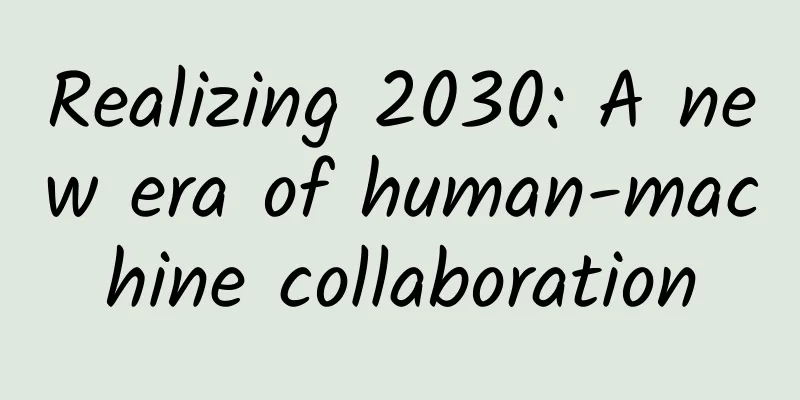Realizing 2030: A new era of human-machine collaboration

|
Dell Technologies released a report titled "A New Era of Human-Machine Collaboration" showing that in 2030, all companies will become technology companies. Therefore, companies must start thinking about how to transform infrastructure and productivity from now on to prepare for the future. This study was organized by the Institute for the Future (IFTF), and invited 20 experts from technology, academia and business fields from all over the world to discuss how emerging technologies such as artificial intelligence, robots, virtual reality, augmented reality and cloud computing will change the way we live and work in the next decade. The report also provides in-depth insights into how consumers and companies can prepare for this changing society. According to the report, as software, big data and data processing capabilities make great progress, emerging technologies based on these basic capabilities will subvert people's lives. The relationship between society and machines will enter a new stage, which will be characterized by: Higher efficiency and more possibilities help humans transcend their limitations. Humans will become "digital commanders" and technology will become an extension of humans, better guiding and managing our daily activities. With leading data matching technology, companies can find and hire the right talent around the world. People must master the skills of "on-the-fly learning". Rapid changes will give rise to new industries, and people will need to learn new skills quickly to continue to survive and develop. Dell Digital Transformation Index shows that 52% of senior decision makers from 16 countries around the world said that their industry has experienced huge disruption caused by digital technology. Nearly half of the companies believe that they may be eliminated in the next 3-5 years. Jeremy Burton, Dell’s chief marketing officer, said: “The industry has never experienced such a major disruption. The pace of change is so real that we have reached a ‘do or die’ moment. To make a leap in the era of human-machine collaboration, companies need to transform into digital companies with software at their core. However, companies must act quickly to build machine capabilities, prepare their infrastructure and enhance the capabilities of their employees to adapt to this change as soon as possible.” Rachel Maguire, research director at the Institute for the Future, said: “We are faced with two extreme views on machines and the future: people are anxious about technology causing job losses or optimistic views that technology is a panacea for all social and environmental problems. Instead, we need to focus on the new characteristics of the relationship between technology and humans, and how we can prepare accordingly. If our efforts in human-machine collaboration are successful, their impact on society will benefit everyone. Other highlights from the report include: In 2030, human dependence on technology will evolve into a true human-machine partnership. Human strengths in creativity, passion, entrepreneurial thinking, etc. will complement the capabilities of machines in speed, automation, and efficiency, which will greatly improve productivity and bring new opportunities to all walks of life and all kinds of positions. Technology will not necessarily replace workers, but the process of finding a job will change. Work will no longer be a fixed location, but will be broken down into a series of tasks. Machine learning technology makes individual skills and abilities searchable, and companies can match the most suitable talents for different tasks. 85% of the jobs expected in 2030 have not yet been created. The pace of change is so rapid that people will need to learn “on the go” using emerging technologies such as augmented reality and virtual reality. The ability to acquire new knowledge will be more valuable than the knowledge itself. You can join our small circle by downloading the PDF version. 199IT thanks you for your support! |
>>: Ericsson: 2017 Survey Report on the Impact of VR/AR on Daily Life
Recommend
How do community products build a content system?
For community products, it is particularly import...
How to operate a (product) APP?
This article is a summary of novice operations . ...
Sad news: Fat people who exercise can only become a strong fat person
Spring is a season for losing weight. In order to...
Quantum peak showdown: Einstein still didn’t understand this time!
Produced by: Science Popularization China Author:...
Why are baked sweet potatoes more delicious? Which sweet potato is the best in the baked sweet potato world?
If there is anything that can soothe the hearts o...
What exactly are the cloud phones that Baidu and Huawei are working on?
[[350635]] Recently, Baidu officially released th...
Learn common Mac commands to help iOS development
[[183871]] Heavy technology Preface In the proces...
How to do data analysis for information flow promotion? Avoid these 4 pitfalls!
If you work in bidding, how can you grow into a p...
Baby thermos kettle turns into "toxic glue" kettle? Netizens smash kettle at home to verify
In the past two days, many parents on social medi...
Wang Chong: Business model + team management + traffic breakthrough
Course Catalog: ├──Wang Chong 1.1.mp4 1.11G ├──Wa...
Bidding tutorial: How to formulate a mobile bidding promotion strategy?
In recent years, due to the rapid rise of mobile ...
Content information mini program qualifications, what basic functions are needed to develop a news information mini program?
Q: What basic functions are needed to develop a n...
How to customize SEM promotion plan?
When doing promotion, the first thing to confirm ...
Look! The sun is also "drawing"? It once caused power failure!
Recently, Nature announced the best scientific ph...
Changan Mazda MAZDA EZ-6 sets new value standard for new energy joint ventures, makes global debut at Beijing Auto Show
On April 25, Changan Mazda's first electric s...









